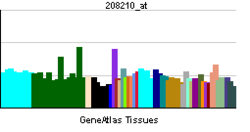MAS1
| edit |
| MAS1 onkogen | |||||||||||
|---|---|---|---|---|---|---|---|---|---|---|---|
| Identifikatori | |||||||||||
| Simboli | MAS1; MAS; MGC119966 | ||||||||||
| Vanjski ID | OMIM: 165180 MGI: 96918 HomoloGene: 1782 IUPHAR: MAS1 GeneCards: MAS1 Gene | ||||||||||
| |||||||||||
| Pregled RNK izražavanja | |||||||||||
 | |||||||||||
| podaci | |||||||||||
| Ortolozi | |||||||||||
| Vrsta | Čovek | Miš | |||||||||
| Entrez | 4142 | 17171 | |||||||||
| Ensembl | ENSG00000130368 | ENSMUSG00000068037 | |||||||||
| UniProt | P04201 | Q0VB49 | |||||||||
| RefSeq (mRNA) | NM_002377 | XM_622557 | |||||||||
| RefSeq (protein) | NP_002368 | XP_622557 | |||||||||
| Lokacija (UCSC) | Chr 6: 160.25 - 160.25 Mb | Chr 17: 12.68 - 12.69 Mb | |||||||||
| PubMed pretraga | [1] | [2] | |||||||||
MAS proto-onkogen je protein koji je kod ljudi kodiran MAS1 genom.[1]
MAS1 struktura sugestira da ovaj protein pripada klasi receptora koji su spregnuti sa GTP-vezujućim proteinima. MAS1 poseduje GPCR 7-TM konzervirani strukturni motiv. Ovaj zaključak je uzveden na osnovu predviđenih hidrofobinih segmenta koji su tipični za spoljašnje strane transmembranskog alfa-heliksnog svežnja. Pretpostavlja se da aktivirani MAS1 receptor modulira jednu od kritičnih komponenti signalnog puta regulacije rasta.[1]
Vidi još
- MAS1 onkogen
Literatura
Dodatna literatura
- Hanley MR (1992). „Molecular and cell biology of angiotensin receptors.”. J. Cardiovasc. Pharmacol. 18 Suppl 2: S7–13. PMID 1725048.
- Hanley MR, Cheung WT, Hawkins P, et al. (1990). „The mas oncogene as a neural peptide receptor: expression, regulation and mechanism of action.”. Ciba Found. Symp. 150: 23–38; discussion 38–46. PMID 2197067.
- Rabin M, Birnbaum D, Young D, et al. (1988). „Human ros1 and mas1 oncogenes located in regions of chromosome 6 associated with tumor-specific rearrangements.”. Oncogene Res. 1 (2): 169–78. PMID 3329713.
- Jackson TR, Blair LA, Marshall J, et al. (1988). „The mas oncogene encodes an angiotensin receptor.”. Nature 335 (6189): 437–40. DOI:10.1038/335437a0. PMID 3419518.
- Young D, Waitches G, Birchmeier C, et al. (1986). „Isolation and characterization of a new cellular oncogene encoding a protein with multiple potential transmembrane domains.”. Cell 45 (5): 711–9. DOI:10.1016/0092-8674(86)90785-3. PMID 3708691.
- Riesewijk AM, Schepens MT, Mariman EM, et al. (1996). „The MAS proto-oncogene is not imprinted in humans.”. Genomics 35 (2): 380–2. DOI:10.1006/geno.1996.0372. PMID 8661154.
- Xu X, Quiambao AB, Roveri L, et al. (2000). „Degeneration of cone photoreceptors induced by expression of the Mas1 protooncogene.”. Exp. Neurol. 163 (1): 207–19. DOI:10.1006/exnr.2000.7370. PMID 10785460.
- Alenina N, Baranova T, Smirnow E, et al. (2002). „Cell type-specific expression of the Mas proto-oncogene in testis.”. J. Histochem. Cytochem. 50 (5): 691–6. PMID 11967280.
- Strausberg RL, Feingold EA, Grouse LH, et al. (2003). „Generation and initial analysis of more than 15,000 full-length human and mouse cDNA sequences.”. Proc. Natl. Acad. Sci. U.S.A. 99 (26): 16899–903. DOI:10.1073/pnas.242603899. PMC 139241. PMID 12477932.
- Santos RA, Simoes e Silva AC, Maric C, et al. (2003). „Angiotensin-(1-7) is an endogenous ligand for the G protein-coupled receptor Mas.”. Proc. Natl. Acad. Sci. U.S.A. 100 (14): 8258–63. DOI:10.1073/pnas.1432869100. PMC 166216. PMID 12829792.
- Mungall AJ, Palmer SA, Sims SK, et al. (2003). „The DNA sequence and analysis of human chromosome 6.”. Nature 425 (6960): 805–11. DOI:10.1038/nature02055. PMID 14574404.
- Gerhard DS, Wagner L, Feingold EA, et al. (2004). „The status, quality, and expansion of the NIH full-length cDNA project: the Mammalian Gene Collection (MGC).”. Genome Res. 14 (10B): 2121–7. DOI:10.1101/gr.2596504. PMC 528928. PMID 15489334.
- Canals M, Jenkins L, Kellett E, Milligan G (2006). „Up-regulation of the angiotensin II type 1 receptor by the MAS proto-oncogene is due to constitutive activation of Gq/G11 by MAS.”. J. Biol. Chem. 281 (24): 16757–67. DOI:10.1074/jbc.M601121200. PMID 16611642.








